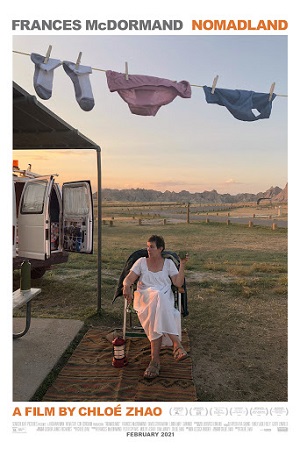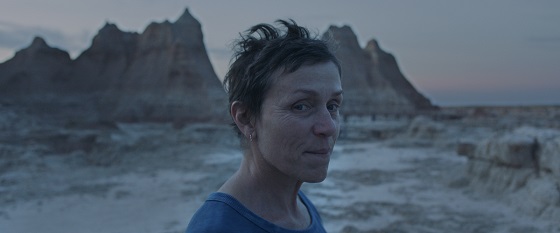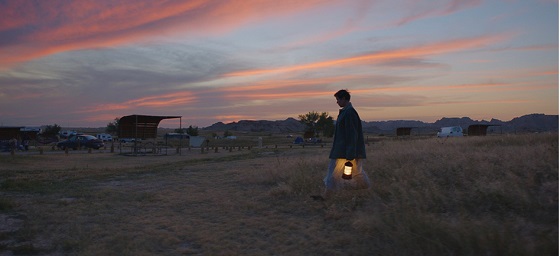

[Rating: Rock Fist Way Up]
Nomadland premieres in theaters and on Hulu on February 19
A full-package powerhouse that combines a career best performance with masterful direction and some of the best cinematography of the century, Nomadland is every bit as magnificent as its awards buzz might suggest. A moving character study that incorporates meditations on aging, legacy, industrialization, and the vanishing American middle class, the film by director Chloé Zhao communicates in whispers, never guiding or shepherding its audience. These hushed moments speak volumes throughout the 107-minute runtime, however, and create as comprehensive a picture of the modern American identity as any film of this era.
A title card at the top explains that the town of Empire, Nevada went bust in January 2011 with the collapse of US Gypsum, the local sheetrock manufacturer. By July the town didn’t even have a zip code any longer, and longtime residents like Fern (Frances McDormand) had to figure out a new future for themselves. When the audience meets her, Fern is packing items from a storage unit into her van, which she takes to an RV park frequented by seasonal workers in the nearby Amazon shipping facility. She’s not homeless, just “houseless,” she tells an old acquaintance, and her movement between different temporary work gigs is all part of this new phase of her life.
Fern knows people who could put her up in a house, yet she repeatedly swats these offers down throughout Nomadland, preferring instead to stay on the road and in her van. Although she begins to fall in with a group of nomadic, seasonal workers with backgrounds similar to her own, she appears hesitant to join any kind of a community, even one defined by its detachment from the stationary. Fern still has her storage unit in Empire, after all, and while she picks up some helpful tricks about life on the road, she’s not ready to commit to anything beyond the next hard-earned paycheck.

As the film moves into its second act, it follows Fern as she makes new acquaintances, works physically demanding jobs (Amazon warehouse picker, beet root slinger, rock stand merchant), and struggles to make ends meet. Set in the aftermath of the Great Recession, the film reflects the harsh reality of the post-prime labor force, and what unemployment looks like after age 50 or 60. Yet this is only garnishment to a story whose main course revolves around Fern, and what her uniquely American life has become.
Fern explains at one point that after Empire collapsed and her husband died, there was nothing left in the world to prove that she’d ever been a part of it. To pick up sticks and start over, to live in her sister’s guestroom, to accept the loving embrace of a new man: all of them represent a concession that her previous life is over. Fern might be ready to break her back washing RV campground bathrooms, she might be okay with shitting in a bucket, and she can even stomach the indignity of admitting to strangers that she lives in her van, but she’s not ready for this.
Fern is the picture of the post-World War II baby boomer spirit, setting out on her own the moment she was able to chase her modest, not at all ostentatious, slice of the American Dream. She fell in love, got married, hitched herself to a corporate entity, and did everything a free-spirited consumer should. Her struggle is one of identity and legacy, and a reflection on the hollow promise of Manifest Destiny; Fern has outlived her social guardrails and has nothing to show for a life lived according to America’s classic bootstrap plan. Fern’s society has outpaced her, sure, but what haunts her is the betrayal of a world utterly unconcerned with her place (or past) in it.

Zhao repeatedly places Fern in the center of a vast, ancient American landscape, allowing the natural beauty of desert sunrises, snow-swept plains, lush forest timber, and rocky sediment deposits to adorn the background of the film’s best scenes. This is more than cinematic flexing, however (though it is indeed stunning), and places Fern within a larger national story that’s rooted in a paradoxical struggle between progress and stasis. Fern wants to be a part of something that lasts, something that is remembered, and in her travels, she seems to be most at peace when connecting with the eternal.
And yet, she is always moving through it. Finding her place in this world, discovering that balance between the fleeting and the perpetual defines Fern’s story in Nomadland, and it’s a remarkable thing to behold. McDormand carries the picture through her largely quiet, understated performance, which deploys her signature steely resolve mixed with tender warmness to perfect effect. Although she allows Fern a few moments of unguarded vulnerability (like the scene at the RV show), many of the instances where she has to play against others exist on multiple levels, where regret, jealousy, or even despair seep into the corners (the scene at her sister’s BBQ).
Fern’s budding relationship with fellow nomad, Dave (David Strathairn), is a small but crucial development within the narrative, and both actors deserve credit for playing these moments with layers of backstory evident but left unsaid. Zhao’s quiet but confident direction gives McDormand all the room needed to bring out the story of not just Fern, but of a country and shared national mythos that are churning out 100s of Ferns by the hour. Some will move in with friends and family, others will take to the road, and a few will die before they get a chance to realize their life’s fullest potential, leaving their “boat in the driveway.” Nomadland works as well as it does because it never judges its characters, or the audience, for taking any of these paths, reveling instead in the meditation of what all of them mean.





Comments on this entry are closed.